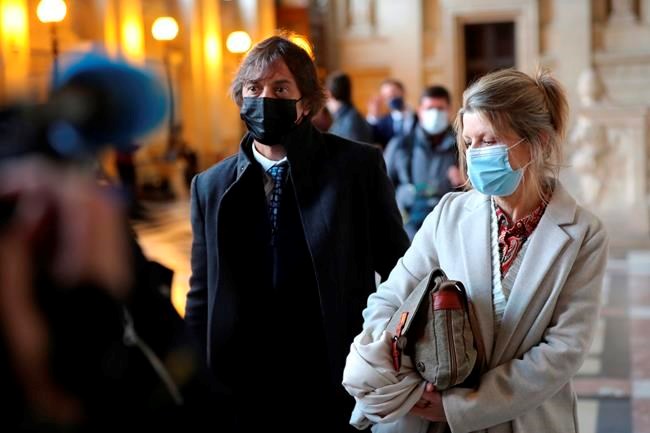PARIS — Head lowered, an Islamic State operative listened silently as a Paris judge on Monday detailed his alleged plot to unleash mass slaughter on a high-speed train before he was tackled and subdued by American vacationers whose heroics inspired Clint Eastwood to direct a Hollywood re-enactment.
Opening a month-long trial for Ayoub El Khazzani, the judge said the 31-year-old Moroccan with ties to a notorious mastermind intended to “kill all the passengers" aboard the Amsterdam to Paris train in 2015 but “lost control of events.”
El Khazzani, who is on trial with three suspected accomplices, acknowledged the charges against him with a simple “Yes.”
He risks life in prison if convicted of attempted terrorist murder.
The heavily-armed and bare-chested El Khazzani wounded a French-American who managed to briefly yank a Kalashnikov from his hands before the three vacationing Americans took him down.
The drama on the train is portrayed by investigators as one of a series of IS-linked attacks in Europe that include the Nov. 13, 2015 massacre in Paris at a music hall and cafes that killed 130 people. A failed 2015 attack in Verviers, Belgium, and 2016 attacks in Brussels are also among them.
The suspected mastermind of the Paris massacre, Abdel Hamid Abaaoud, also worked as behind-the-scenes leader of the train attack, according to investigators. Their probe showed that Abaaoud and El Khazzani
French special forces killed Abaaoud days after the Bataclan attack.
The alleged train attack plot went awry when passengers moved in on El Khazzani.
One of the Americans who tackled the gunman told investigators that he seemed high on drugs and “completely crazy,” the judge said.
A lawyer for the two U.S. servicemen and their friend, whose electrifying capture of El Khazzani inspired Eastwood's movie “The 15:17 to Paris", said their heroics during the drama on Aug. 21, 2015 thwarted a “slaughter.”
“This terror attack could have killed up to 300 people based on the number of ammunition that was found on the terrorist and in his bag,” said the attorney, Thibault de Montbrial.
With El Khazzani and his three alleged accomplices seated behind protective glass in a heavily-secured courtroom, the trial opening was largely taken up with procedural issues including whether Eastwood’s presence is needed. That question was resolved at day's end, with the court deciding no because he wasn't a direct witness, French media reported. The three Americans hailed as heroes are to testify later this week.
El Khazzani boarded the train in Brussels armed with a Kalashnikov, nine clips with 30 rounds each, an automatic pistol and a cutter, according to investigators. A bottle of high flammable yellow liquid also was found in his black suitcase, the judge said.
His lawyer, Sarah Mauger-Poliak, said El Khazzani “regrets having allowed himself to become indoctrinated” by extremist propaganda and wants "to demonstrate his remorse.” He wants to speak to the victims if allowed, she said.
El Khazzani, bearded under his mask and his hair pulled back in a bun, said when asked about his prison conditions after several reprimands, “It's hard,” but “I deserve it.”
Three others, who were not on the train, are being tried as alleged accomplices.
Bilal Chatra, 24, an Algerian member of the Islamic State group, would have been the second man on the train but dropped out of the plot a week earlier. He left Syria for Europe a week before to set up the exit route.
Mohamed Bakkali allegedly sheltered the attackers in Budapest, Hungary, which he denies. The two were arrested in Germany in 2016. A third man, Redouane El Amrani Ezzerrifi, allegedly piloted a boat to help in their return to Europe.
The trial ties into the massacre of 130 people in Paris three months later, on Nov. 13, 2015, at the Bataclan music hall and restaurants and cafes.
Once aboard the train, El Khazzani lingered in a restroom between cars and emerged bare-chested with the Kalashnikov. One waiting passenger struggled with the attacker, then a French-American, Mark Magoolian, wrestled the Kalashnikov away — before being shot himself by a pistol. He jumped in after a French banker, who has asked to remain anonymous, wrestled unsuccessfully with El Khazzani.
Spencer Stone, then a 23-year-old U.S. airman, has said he was coming out of a deep sleep when the gunman appeared. He said Alek Skarlatos, then a 22-year-old U.S. National Guardsman recently back from Afghanistan, “just hit me on the shoulder and said ‘Let’s go.’”
The men, all from California and following what Skarlatos has said was “gut instinct," snapped into action. Stone and Skarlatos moved in to tackle the gunman, helped by a third man, Anthony Sadler, 23, then a student. Stone said he choked El Khazzani unconscious. A British businessman also joined the fray.
Stone, whose hand was injured by the cutter, is also credited with saving Magoolian, whose neck was squirting blood. Stone said he “just stuck two of my fingers in his hole and found what I thought to be the artery, pushed down and the bleeding stopped.”
The train rerouted to Arras, in northern France, where El Khazzani was arrested.
___
Nicolas Vaux-Montagny reported from Lyon, France.
Elaine Ganley And Nicolas Vaux-Montagny, The Associated Press



